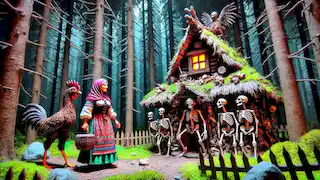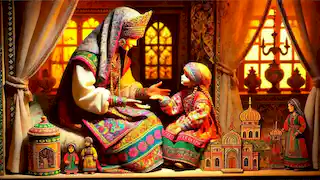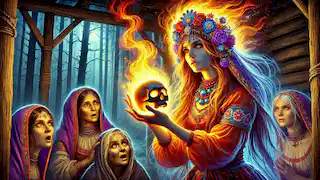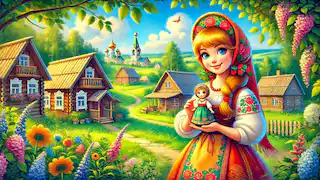Once upon a time, in a picturesque village nestled within the vast expanse of Russia, there lived a wealthy merchant with his lovely wife and their only daughter, Vasilisa. This family was happy and prosperous, living a life filled with love and joy. Vasilisa was a beautiful girl with striking features and an equally kind heart. Her presence was like a ray of sunshine, bringing warmth and happiness to everyone around her. But the happiness of this small family was not to last.
When Vasilisa was just eight years old, her mother fell gravely ill. The village doctor tried every remedy he knew, but her condition only worsened. On her deathbed, her mother called Vasilisa to her side. With trembling hands, she gave Vasilisa a small, wooden doll.
"Listen carefully, my dear Vasilisa," her mother whispered, her voice weak but full of love. "Keep this doll with you always. When you are in need, feed it a little to eat and a little to drink, and then tell it your troubles. It will help you."
With that, her mother kissed her goodbye and passed away, leaving Vasilisa heartbroken and alone. She clutched the doll tightly, feeling a strange comfort from its presence. Despite her grief, she remembered her mother’s words and kept the doll close, as her mother had instructed.
Time went by, and Vasilisa's father eventually remarried. Her new stepmother was a woman of cold beauty with two daughters of her own, Olga and Marfa. Unlike Vasilisa, they were not blessed with beauty or kindness, and they envied Vasilisa's charms. Vasilisa’s father, a kind man, did his best to create a harmonious household, but his efforts were in vain. The stepmother and stepsisters harbored deep jealousy towards Vasilisa and treated her cruelly.
Vasilisa's days were now filled with endless chores. She scrubbed floors until her hands were raw, cooked meals for the family, and fetched water from the distant well. Despite the harsh treatment, Vasilisa remained gentle and kind, always carrying the little wooden doll in her pocket. Whenever she felt overwhelmed, she would secretly give the doll a bit of bread and water and whisper her troubles to it. Miraculously, the doll would come to life, offering words of comfort and wise advice, which helped Vasilisa endure her hardships.
Years passed, and Vasilisa grew more beautiful with each passing day. Her stepmother, unable to bear it any longer, devised a sinister plan to get rid of her. One day, Vasilisa's father had to go on a long journey for his trade, leaving the stepmother in charge. She seized this opportunity to move the family to a small hut on the edge of a dense, dark forest, where the fearsome witch Baba Yaga was said to live.
The forest was a place of mystery and dread, filled with strange noises and eerie shadows. The villagers often spoke of Baba Yaga in hushed tones, fearing her wrath and her insatiable hunger for human flesh. They described her as an ancient witch with a long nose, iron teeth, and eyes that glowed like hot coals. Her hut, they said, stood on chicken legs
and was surrounded by a fence made of human bones.
One evening, as the sun set and the forest grew dark, the stepmother gave Vasilisa a task that she hoped would spell her doom.
"Vasilisa, we have no more light in the house," she said, feigning concern. "You must go to Baba Yaga and ask her for fire."
Vasilisa was terrified but knew she had no choice. She took her little wooden doll, a bit of bread, and some water, and ventured into the dark forest. She walked and walked, the trees seeming to close in around her, until she saw a small, crooked hut standing on chicken legs, surrounded by a fence made of human bones.

Gathering her courage, Vasilisa approached the hut. "Grandmother, grandmother," she called, "please give me some fire. My stepmother has sent me."
The gate creaked open, and Baba Yaga appeared. She was even more frightening than the stories had described, with her long nose sniffing the air and her iron teeth glinting in the dim light.
"Who are you, and what do you want?" she growled, her voice echoing through the forest.
"I'm Vasilisa, and I've come to ask for fire," Vasilisa replied, trying to keep her voice steady.
Baba Yaga squinted at her with suspicion. "Very well," she said. "But first, you must do some tasks for me. If you succeed, you shall have your fire. If you fail, you shall be my supper!"
With that, Baba Yaga set Vasilisa to work. She had to clean the house until it shone, cook a hearty meal, and sort a huge pile of grain by morning. Exhausted and scared, Vasilisa took out her wooden doll and fed it a little bread and water.
"Dolly, dolly, help me," she whispered. "I have so much to do, and I cannot do it alone."
The doll came to life and comforted her. "Do not worry, Vasilisa. Rest now, and I will do the work for you."
Vasilisa lay down and slept, trusting the doll completely. In the morning, everything was done perfectly. The house was spotless, a delicious meal was prepared, and the grains were neatly sorted. Baba Yaga was surprised but did not show it. Instead, she gave Vasilisa more impossible tasks. Each night, Vasilisa turned to her doll, and each night, the doll helped her. Baba Yaga began to suspect something.
One day, Baba Yaga asked Vasilisa, "How do you manage to complete all these tasks?"
"My mother's blessing helps me," Vasilisa replied, hoping to avoid revealing the secret of the doll.
Baba Yaga shrieked in anger. "I want no blessed ones in my house! Take your fire and go!"
Baba Yaga handed Vasilisa a skull with burning eyes, and Vasilisa hurried home with it. When she arrived, the burning eyes of the skull turned to ash the stepmother and stepsisters, who had been cruel to her.
Freed from their torment, Vasilisa buried the skull and went to live with a kindly old woman in the village. There, she waited for her father's return and lived in peace. The old woman, seeing Vasilisa's beauty and good heart, treated her like her own daughter.
Life with the old woman was calm and filled with gentle routines. Vasilisa helped with the household chores, gathered herbs from the forest, and learned to weave and spin. One day, the old woman asked Vasilisa to spin flax for her. Vasilisa spun it into the finest thread and wove a beautiful cloth, unlike any the old woman had seen before. The cloth was so fine and delicate that it shimmered like moonlight.
The old woman took the cloth to the Tsar, who was known for his appreciation of fine textiles. When the Tsar saw the cloth, he was so impressed that he wanted to meet the girl who had made it. He sent his guards to bring Vasilisa to the palace.
Vasilisa was brought to the palace, and the Tsar was struck by her beauty and grace. He fell in love with her at first sight and asked her to marry him. Vasilisa, overwhelmed by the sudden turn of events, agreed. Their wedding was a grand ceremony, attended by nobles from far and wide. The palace was decorated with flowers and fine tapestries, and the celebrations lasted for days.

Vasilisa's father returned from his journey to find his daughter a Tsarina. He was overjoyed and proud of her. Vasilisa invited the old woman who had taken care of her to live in the palace, and they all lived happily ever after.
Vasilisa never forgot her mother's blessing or her little wooden doll, which she kept close to her always. She ruled wisely and kindly, beloved by all her subjects. She was known for her wisdom and her ability to resolve disputes with fairness and compassion. Her reign brought peace and prosperity to the land, and the people adored her.
Years later, Vasilisa had a daughter of her own. When the girl was old enough, Vasilisa gave her the wooden doll and told her the story of her journey and the blessings it had brought. The little girl cherished the doll just as her mother had, knowing that it carried the spirit of love and protection.

And so, the tale of Vasilisa the Beautiful was passed down through generations, a story of courage, kindness, and the magic of a mother's love. The legend of Vasilisa spread far and wide, inspiring many with its message of resilience and the power of goodness.
As the years went by, Vasilisa and the Tsar had many adventures together. They traveled to distant lands, forged alliances, and built a strong and prosperous kingdom. Vasilisa's wisdom and the Tsar's bravery made them a formidable pair, admired by all.
In their later years, Vasilisa and the Tsar focused on nurturing the next generation. They taught their children the values of kindness, courage, and justice. Vasilisa's daughter, who had inherited her mother's beauty and grace, became known for her own acts of kindness and bravery.

The wooden doll, now a cherished family heirloom, continued to be passed down from mother to daughter. Each generation learned the story of Vasilisa the Beautiful, carrying forward the legacy of love, resilience, and the magic of a mother's blessing.
In the end, the story of Vasilisa the Beautiful is not just a tale of adventure and magic. It is a story of the enduring power of love and kindness, a reminder that even in the darkest times, there is light to be found if one has the courage to seek it. Vasilisa's journey, marked by trials and triumphs, continues to inspire and uplift, a testament to the strength of the human spirit and the timeless magic of a mother's love.



















